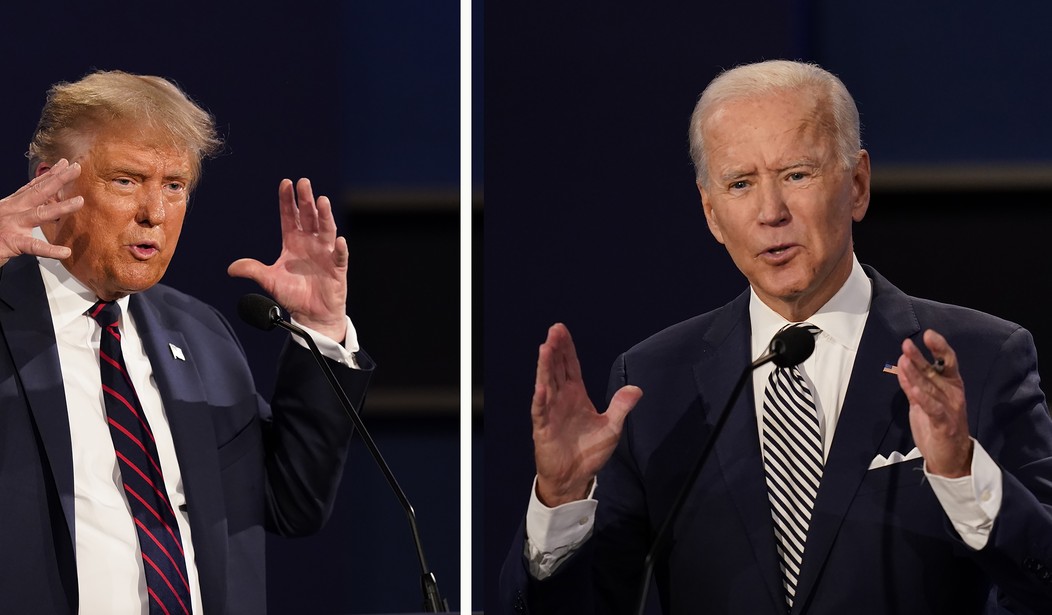The 2024 U.S. presidential campaign is unfolding as a fascinating and historic marathon of unexpected and disturbing events causing widespread political and social uncertainty and anxiety at home, plus ominous opportunities abroad for adversaries.
Despite its often raucous and, to the world, inexplicably quirky politics, the United States has for generations been a stable bedrock of Western democracy. It has had the strongest economy, persistent values, military, and predictable actions that allies could count on for their own planning and security.
Now, not so much.
The United States has its oldest president in history, a man who turns 81 this month. Joe Biden served six Senate terms from an irrelevant state famed for processing bankruptcies and two as a goofy vice president, with several failed assignments, absolutely no major accomplishments, and two aborted runs for the White House.
On the third attempt, the Democrat was successful only because of a shallow primary field and intense distaste for the GOP incumbent.
Since inauguration, the man who took an oath to protect the country has launched and driven a series of disastrous policies and actions. They are, however, ideal choices for anyone wanting to damage this country.
Biden started with immediate destruction of the nation’s hard-won energy independence on ideological grounds because he’s mandated electric cars in 2035.
Then came suspending Trump’s Mexican border controls, creating, in effect, an open border that has seen more than eight million illegal immigrants enter the United States and disperse without tracking. And no meaningful efforts to stop them.
In some cases, this administration has even flown or bused them to interior cities, now expected to raise taxes to house, educate, and support them.
To please his extreme left, Biden sought, signed, and spent in excess of five trillion dollars in new money that ignited the worst wave of inflation in four decades and continues as an invisible, heavy tax on Americans.
He’s been oblivious to developing national crises, such as shortages of infant food and medicines, and ineffective addressing them.
Biden has drained the nation’s emergency oil reserves by almost half (the national "emergency" was midterm election threats to Democrats). Contrary to his promise, the president is not refilling the reserves. Because evil fossil fuels won't be needed after 2035.
Barack Obama, who warned Democrats not to underestimate Biden’s ability to screw things up, thrust Biden into the vice presidency anyway.
Sure enough, as president, Biden did just that by postponing the Afghan troop withdrawal to the worst possible time of year, then rejecting Pentagon advice, then changing his mind, then presiding over the kind of mass evacuation panic he promised would not happen.
Hundreds of Afghans and 13 U.S. military personnel perished. Biden still calls all that an "extraordinary success."
During the ceremonial return of the fallen's flag-draped caskets, Biden was visibly impatient, checking his watch frequently. Asked on national TV about desperate Afghans clinging to the outside of departing U.S. planes until falling to their death, the politician touted as Mr. Empathy replied, “That was four days ago.”
Biden has long been notorious for lying and calling it "the God's truth," even when it is clearly not. That's one thing for a senator. It's another for a commander in chief with the power to send military men and women into harm's way.
Then there's Joe Biden's dereliction of duty, allowing that massive Chinese spy balloon to complete its intelligence mission traversing the United States. And the unfolding scandal over millions of dollars in money transfers from China to the Bidens in return for we don't yet know what.
Most recently disturbing is the obvious physical and mental decay in this commander in chief. Signs of weakness and confusion emerged during the 2020 campaign when he spent much of the time Zooming from his Delaware basement and ending work by mid-morning.
Since then, his shortened workweek schedules have been largely confined to late morning and early afternoons, save for evening fundraisers. He’s done the fewest interviews of any modern president, mainly with friendly media outlets.
He’s spent almost 40 percent of his term on vacation in Delaware, where his visitors and activities go unrecorded.
Virtually every public appearance, too many to chronicle individually, contains at least one embarrassing moment. He walks with an uncertain gait, falls at times, and often needs assistance finding his way off-stage.
Biden forgets names, calls Kamala Harris president and others by the wrong name, even foreign leaders. He slurs and stumbles speaking, even when reading from written notes, falls asleep in meetings, and often rambles into incoherent, senseless tangents ending with “Anyway….”
Biden, who once vowed to serve only one term, now says he intends to remain president until Jan. 20, 2029.

Publicly, elected Democrats, media, and Jill Biden act as if the naked president’s new wardrobe is magnificent. And that he will certainly be renominated next August, as is routine for incumbents.
Democrats have some deep internal divisions. But despite the incumbent’s low job approval and high disapproval in virtually every area, these Democrats profess 100 percent support for the president’s renomination. Maybe 110 percent, by golly.
All Democrats, that is, except Rep. Dean Phillips of Minnesota. He’s challenging Biden in an obviously hopeless cause.
Establishment Democrats far overreacted to the upstart’s bothersome candidacy, revealing deep fears of a genuine Biden vulnerability.
Turns out now, Biden may have outwitted himself. Because he finished fifth with 0 delegates in the 2020 New Hampshire primary, Biden moved more sympathetic South Carolina into the first primary slot this cycle. So he'd look good.
But, oops, Biden failed to register as a candidate in the Granite State.
New Hampshire is likely to jump ahead anyway. As the lone Democrat on the ballot, a strong Phillips’ showing in the first primary would seriously embarrass the sitting president.
No one studies history anymore because it’s so irrelevant to modern life. But if they did and looked back at the 1968 New Hampshire Democrat primary, they would see something noteworthy.
That year, another Democrat member of Congress from Minnesota, Sen. Eugene McCarthy, launched an obviously hopeless primary challenge to Democrat President Lyndon Johnson over the Vietnam War.
McCarthy didn’t win. However, he did so well that a few weeks later, Johnson abandoned his reelection bid.
Because of so much uncertainty, some ambitious Democrats like Govs. J.B. Pritzker of Illinois, Josh Shapiro of Pennsylvania, Gretchen Whitmer of Michigan, and California’s Gavin Newsom are quietly preparing politically, just in case, you know, there’s some unexpected change of plans.
If Biden, whether voluntarily or not, withdrew as the party’s presumed nominee by year’s end, alternatives would likely be able to get on sufficient primary ballots.
If Biden were to pull the plug into the new year, the decision on a nominee would probably fall to delegates in Chicago, producing a divisive shootout among numerous rivals on national TV.
The unusual campaign for the Republican nomination is fraught with uncertainty and challengers, too. Donald Trump is also running as an incumbent, which he isn’t.
If elected, Trump would be only the second president after Grover Cleveland in 1888 and 1892 to lose an election, then run again successfully.
Trump launched the country’s longest-ever presidential campaign one year ago next week. But his 2024 campaign is much different than 2016 and 2020.
In the first, he was a wealthy upstart, one of 17 GOP wannabes. He was brash, loud, rude, mocked opponents with nicknames, and all that volume gained him an estimated $2 billion in free publicity.
The Fifth Avenue billionaire became an unlikely populist as the only one in the Republican field to recognize and tap into the deep anger and frustrations of the Heartland.
Trump pulled off an historic upset that actually stunned Hillary Clinton into silence overnight. He won three million fewer popular votes than Clinton; many of hers were wasted in Democrat strongholds like California.
But Trump received just enough popular votes in just the right places for a 304 to 227 Electoral College win.
He then proceeded to cement an unusually strong, loyal following by actually keeping most campaign promises – income tax cuts, slashing regulations to create jobs and energy independence, appointing conservative judges and justices, vanquishing ISIS, rebuilding the military neglected under Obama-Biden, increasing its pay, and staunching the flow of illegal immigrants.
While Biden was sheltering in his basement in the fall of 2020, Trump was staging three and four mass rallies a day in several states.
But Trump's pugnacious politics and often unnecessary confrontations that were new and novel in 2016 had grown stale. He got a reported seven million fewer popular votes than Biden, which basically reversed the 2016 Electoral College outcome to 306 to 232.
Since then, Trump and numerous followers refused to accept the outcome as legitimate, which has led to a number of legal charges against them, now in courts.
While they caused sympathetic bumps in his poll numbers, the four indictments and trials consume his time and financial resources and now are complicated by legal attempts to deny him state-level ballot access.
Trump’s 2024 challengers point out he did not pursue numerous 2016 pledges. This time, among other things, Trump has vowed to:
- Potentially fire thousands of federal workers he says are “deep state.”
- Relocate the homeless to tent cities.
- End birthright citizenship.
- Defund the FBI and Justice Department.
- Restrict Chinese ownership of American infrastructure.
- Impose the largest deportation in history on illegal immigrants.
Less noticed is Trump's weakened anti-abortion stance and the reality no president could order all the above.
Some of us had hoped being out of office might temper Trump’s campaign tenor. When Mike Pence abandoned his presidential campaign the other day, Trump could have commented with grace about his former partner’s long public service and loyalty, at least until the Jan. 6 events.
Nikki Haley, who served in Trump’s cabinet too, said of Pence:
He’s been a good man of faith. He’s been a good man of service. And he’s fought for America….We all owe him a debt of gratitude.
Trump's response was:
Because I had a great, successful presidency and he was the vice president, he should endorse me. I chose him, made him vice president. But people in politics can be very disloyal.
Observers have called for further shrinkage of the GOP field to consolidate Trump opposition. But as the Washington Examiner's Byron York points out, many supporters of any dropouts say they’d then back the former president.
Current polls give Trump a wide lead over Haley, whose support has grown recently, and Ron DeSantis. They will debate again Wednesday night on NBC, minus Trump.
There’s little reason for either to drop out now. They're essentially backups in case Trump falters somehow. Despite Trump’s insistence nothing will deter him from seeking the nomination, the serious legal challenges raise questions about his viability as a general election candidate and potentially a president.
Will doubts and that uncertainty during Trump’s trials next year prompt some primary voters to opt for fresher, younger faces without the serious baggage of court cases and potential prison time?
GOP strategists dream of a general election debate with a floundering Biden in another brain freeze-up against the 51-year-old Haley or 45-year-old DeSantis.
While Trump mocks Biden gaffes, the 77-year-old former president has had a few of his own verbal miscues recently. He’s confused Sioux City, Iowa, with Sioux Falls, which is in South Dakota, mixed up the Obama administration with Biden’s, said the leader of Hungary led Turkey, and warned that Biden could lead the country into “World War II,” which ended 78 years ago.
Also, we've not seen an updated, detailed medical report on Trump as we have on Biden.
“This,” said DeSantis the other day in New Hampshire, “is a different Donald Trump than 2015 and ‘16.”
Trump’s expensive rallies are fewer this time, and his travels and appearances lighter. According to one media tally, from February to June this year, Trump visited 20 cities in 13 states compared to DeSantis’ 52 cities in 19 states. Haley did 39 cities in eight states.
Editor's Note: This article was edited post-publication to reflect that the current estimate regarding the number of illegal immigrants who have entered the U.S. during Biden's presidency is eight million.














